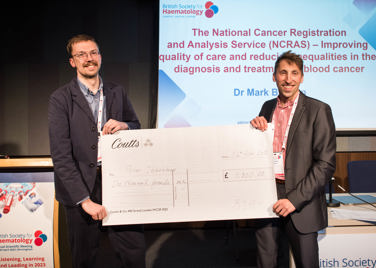
The Crucible Prize is an innovative trainee-led initiative with a £1000 prize. The theme for 2023 award was 'What can haematology learn from history.'
The five best abstracts were selected for oral presentation at the 63rd Annual Scientific which was held on 23-25 April 2023 at the ICC in Birmingham. We are pleased to announce the 2023 winner was Peter Johnstone.
We interviewed Dr Johnstone to learn more about his journey in haematology and his Crucible Prize success.
What is your education/career background in haematology?
I am a relatively new haematology registrar, having just completed my first year of specialty training. Before this I’ve worked as a sickle cell clinical fellow and as a general haematology SHO at a DGH.
What was your Crucible session presentation about?
My presentation centred on the concept of historiography – the history of history. I wanted to explore the idea of how we can think a little more like historians to critically analyse the nature of haematological research; the broad biases we all hold and how this affects the output of our research, how shifts in methodological approach become widespread with little evidence to support them or even how society around us directly influences our choice of research matter. I aimed to demonstrate the very real impact on how we manage our patients, with the hope that by using this framework of historical analysis we can better critique our own academic world and generate better, more equitable output.
What inspired the content of your presentation?
I’ve always been interested in how new treatments or ways of managing disease go from the lab to being accepted practice, not always with the accompanying evidence to back them up. I’m currently working on a haem-onc unit and although it’s always very exciting to see a new drug licensed for a disease, I am just as interested in why one disease might have tens of different drugs available and another has only a few. Is this just an inherent difficulty in treating the disease or are there human factors involved? This was really reinforced for me when I did a job as a sickle cell fellow, managing a disease which had been known about for decades, but only had a single disease modifying drug licensed (at the time). The inequity in comparison to other disease groups was stark. I think if we want to eradicate these inequities then we need to look critically at the research ecosystem as a whole and not just at individual bits of research.
What does winning this award mean to you?
It was a really lovely surprise to win this award, and I can only say I’m hugely grateful to the judges for their comments and to my colleagues at work who inspired me to become a haematologist in the first place.
What would your advice be for someone wanting to choose haematology as their specialism?
Explore as many different parts of haematology as you can! Haem-onc is fantastic and it’s easy to only get exposed to this, but red cell, clotting, lab etc are all hugely interesting and perhaps a little less seen by juniors.
What do you plan to do next in your haematology career?
I hope to do my part 1 exam next year and then think about how I might start planning for a PhD.

